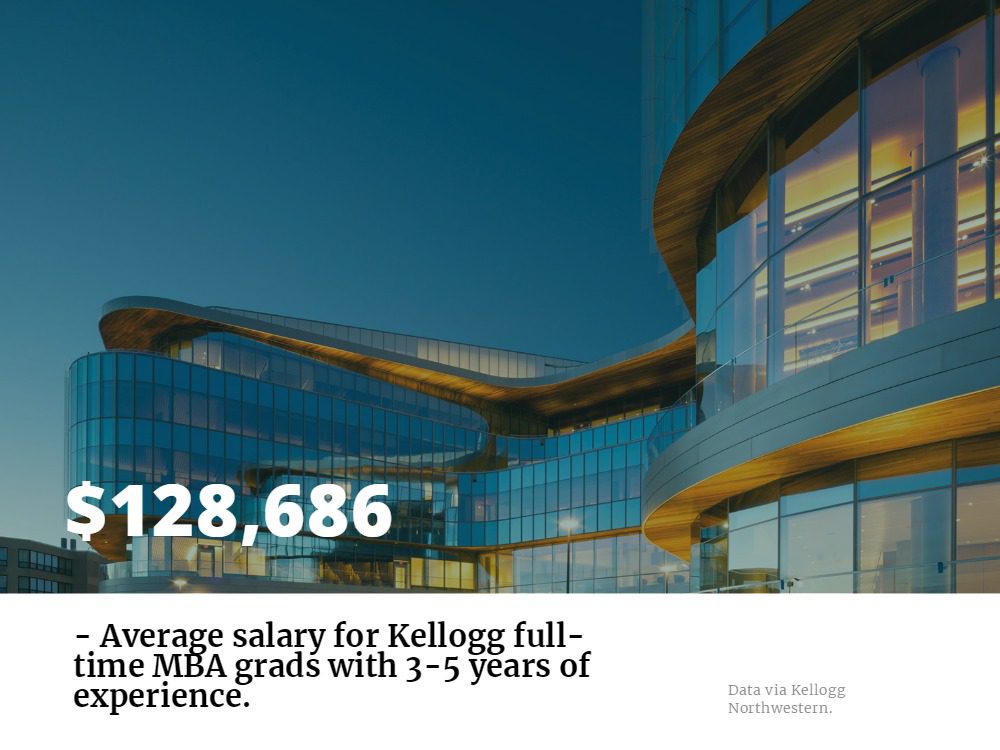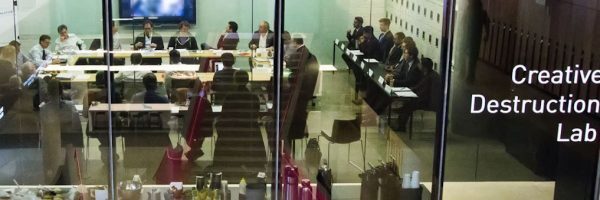How Toronto Schools Can Help You Pay for Your MBA

Earning your MBA can be an expensive prospect. In Canada, tuition at the most expensive MBA programs can cost more than $100,000 for full-time and part-time students. This can be difficult for some low-income applicants.
So, what are some Toronto schools doing to help offset the cost of tuition, living, and other expenses to pay for your MBA? Continue reading…
Toronto News: DeGroote Launches New Fellowship, Rotman Makes New Hire, and More

Let’s visit some of the biggest news coming out of Toronto business schools this week.
EMBA Physicians Invited to Enroll in HLA Fellowship Program – DeGroote Communications Department
According to a press release from the DeGroote School of Business at McMaster University, the Michael G. DeGroote Health Leadership Academy (HLA) is launching a new fellowship program for physicians who enroll in the Executive MBA in Digital Transformation (EMBA) at the DeGroote School of Business. Called the HLA Physician Fellowship Program, five fellows will be selected for the inaugural year of the program, which starts in September 2018.
The EMBA in Digital Transformation is a 13-month program that allows candidates to work while pursuing their degree. It features an evolving interdisciplinary curriculum includes customized, integrated cases developed around new and emerging trends in business and technology.
“The HLA strives to attain a transformative impact on global healthcare by nurturing a community of future leaders,” Del Harnish, Co-Director of the HLA, said. “This fellowship program helps develop these leaders by providing a broad perspective of the intersections of health and business knowledge.”
You can read more about the new fellowship here.
Rotman School Strengthens Business Design and Innovation with New Appointment – Rotman Media Centre
The Rotman School of Management announced an exciting new faculty hire via their Media Centre: Angèle Beausoleil is joining the school’s faculty as an assistant professor of Business Design and Innovation. In addition to developing and delivering new courses, she will be collaborating with Rotman DesignWorks, the school’s Business Design Centre on industry projects to help advance innovation practices at the school.
You can read more about Professor Beausoleil here.
Schulich School of Business Wins 2018 MBA Games – Schulich Media Centre
Last month, a team of MBAs from the Schulich School of Business at York University bested teams from 16 other Canadian graduate business schools to win the 2018 MBA Games. The victory was Schulich’s seventh MBA Games win in 16 years.
“This was our year to win the MBA Games,” said Catherine Sim, Team Captain, who expects to graduate with a Schulich MBA degree later this year. “It feels great to bring the Queen’s Cup back to where it belongs.”
You can read more about the team’s triumph here.
MBA on the Lake: Higher Learning in Chicago & Toronto

To have some type of natural source to balance out the cacophony of city life is crucial to a healthy mind. Not every major city is a concrete jungle, completely broken off from its former natural self or its surroundings. It might surprise city slickers the amount of wilderness opportunities that exist just outside their doorstep.
Take Toronto, for instance. Situated on the shoulder of Lake Ontario, Toronto is surrounded by plateaus, deep forest, ravines, and three rivers. While other Canadian cities may beg to differ, Toronto is the financial and cultural capital of the country. It has long been a hub for migration since the days of the Huron and Iroquois and houses the five largest financial institutions in Canada.
As the heart of American transportation and distribution, Chicago’s metropolitan reputation belies its abundance of natural splendors. Located at the toe of Lake Michigan, the Second City plays host to a wide array of green spaces—arboretums, nature centers, conservatories, and botanical gardens—as well as lakeside walking and biking paths.
Both Chicago and Toronto are world centers for higher education and research, yet offer resplendent surroundings to maintain a balanced state of mind. Both offer much more affordable living situations than New York or San Francisco and are highly underrated for their cultural appeal. Whichever you choose, you will find established, reliable education in your pursuit for the proper MBA. Last month, we analyzed the best part-time offerings in both metros, but let’s take a closer look at the full-time MBA options.
Our Favorite Toronto Full-Time MBA Programs
York University – Schulich School of Business
The Schulich School of Business at York University offers 18 MBA specializations. In addition to full-time programs, the school also accommodate working students with part-time programs that offer both day and evening courses. Students are also able to switch between full and part-time status during their tenure to suit their needs. In 2016, 89 percent of students were hired within three months of graduation by 140 companies. Graduates were employed with an average salary of $91,860 USD and an average signing bonus of $12,050.
McMaster University – DeGroote School of Business
DeGroote School of Business at McMaster University offers full-time and part-time options, as well as a three-year paid work term co-op schedule. Full-time applicants are required to have one year of full-time continuous managerial, professional, or technical work experience (this is where the Co-op plan can come in handy—work as you go). The school offers seven specializations and International study. About 94 percent of recent graduates were employed within six months (over the last two years) with an average starting salary of $71,930 USD.
Western University Canada – Ivey Business School
The Western University Canada Ivey Business School is technically located just outside of Toronto, in London, Ontario. The school offers a full-time program that gives students an opportunity to work with over 200 recruiters, with about 66 percent of graduates finding jobs in Canada. In 2017, 91 percent of the graduating class received a job offer by September 1. Average starting salaries were typically around $90,000 USD with an average signing bonus of $15,000. Other compensations averaged at $9,875.
CHECK THIS OUT: Kings of the North: Should You Get a Part-Time MBA in Chicago or Toronto?
University of Toronto – Rotman School of Management
Students in the Rotman School of Management full-time MBA program are offered 16 major options and more than 90 electives to allow for a very customizable experience. Between 2016 and 2017, 85 percent of full-time Rotman MBA students were employed within six months of graduation and 80 percent landed jobs just within three months. Average starting salaries were $85,000 USD with an average signing bonus of $13,500.
Ryerson University – Ted Rogers School of Management
MBA applicants at the Ted Rogers School of Management at Ryerson University are given two full-time options: the Global MBA or an MBA in the Management of Technology and Innovation (MBA-MTI). Their Global MBA program strives to help their graduates “understand the global context of various industries and have the knowledge necessary to drive innovation and deliver as capable and confident leaders.” The MBA-MTI helps students “gain the skills needed to manage within companies that are focused on tech and innovation.” Last year, about 80.3 percent of graduates found employment within three months of graduation and earned an average starting salary of $89,250 USD.
Our Favorite Chicago Full-Time MBA Programs
Booth School of Business – University of Chicago
The University of Chicago Booth School of Business offers what the school calls the “world’s most flexible MBA program,” and is regarded by U.S. News & World Report as the third best full-time offering in the U.S. The curriculum consists of 20 classes—nine mandatory and 11 courses tailored to personal interest—plus a Leadership Effectiveness and Development (LEAD) program. As of September 2017, an absurd 97.1 percent of graduates reported having received full-time job offers within three months, with 95.3 percent accepted offers in that time. Average starting salaries were an impressive $125,000 with an average starting bonus of $25,000.
Kellogg School of Management – Northwestern University
The Kellogg School of Management at Northwestern University offers two full-time MBA variations, either to be completed in one or two years. The school’s 2017 employment report, which can be downloaded here, detailed that 94.1 percent of graduates received job offers within three months and 90.8 percent of those grads accepted job offers. The average starting salaries for graduates with three-to-five years of work experience was an unsurprisingly lavish $128,686.

Like the Booth School of Business, when comparing Chicago and Toronto programs, financial gain is clearly an advantage for those who elect to study in the U.S. However, perhaps unsurprisingly, schools like Kellogg come with a steeper tuition cost. Applicants for the One Year full-time program should expect to pay more than $133,000 for the entire program, while those in the Rotman School of Management will have to pay around $75,000 USD.
Kellstadt Graduate School of Business – DePaul University
At the DePaul University Kellstadt Graduate School of Business, students can obtain a full-time MBA with the availability of 100 courses in 20 MBA concentrations and 17 specialized Master degrees. In 2016, within six months 89 percent of surveyed graduates were employed, 14 percent being entrepreneurial, contract or freelance. Average starting salaries were about $82,200.
Liautaud Graduate School of Business – University of Illinois at Chicago
The Liautaud Graduate School of Business at the University of Illinois at Chicago full-time MBA is a 13.5 course program, with six courses designed to deepened functional business knowledge, while the remaining 7.5 are geared towards allowing students to customize their experience towards their personal career interests. They provide twelve concentrations in their MBA program.
Mendoza College of Business – Notre Dame
The Mendoza College of Business at Notre Dame University offers two traditional full-time MBA options, which can be taken in two years, or just one in a more accelerated format. According to employment statistics recently released by the business school, about 88 percent of Two-Year full-time students were given a job offer within three months of graduating, with about 86 percent of those graduates accepting the offers. Like many of the major business schools located in the Chicago metro (although, yes, Notre Dame is technically in Indiana), full-time MBA grads enjoyed a lush base salary upon employment, with an average salary of $105,000 for the Class of 2017. Median signing bonuses also ranked in the higher end of the schools on this list, coming in at around $20,000.
The Mendoza College of Business is one of the many business schools in the U.S. that has seen a dramatic shift in terms of graduates moving into the tech industry. Three industries in particular dominated when it came to employing Mendoza MBA grads: tech, financial services, and consulting. However, a slim majority (24.7 percent) joined the tech industry, enjoying salaries slightly higher than the Mendoza average, coming in at $110,000.
Quinlan School of Business – Loyola University
The Quinlan School of Business offers full-time MBA offering is one of the most affordable high-quality Chicago options out there, with the most recent full-cost of the program coming in at $73,422; comparable to many of the aforementioned Toronto programs. And unlike many of the programs on this list, Quinlan isn’t located in some quaint suburb. Rather, the school is centered right on the historic Magnificent Mile in Chicago, fully integrated into the vibrant city.
Thinkers50 Names Rotman Professor One of World’s Best Management Minds

Roger Martin, a professor and former dean at the Rotman School of Management at the University of Toronto, has been named the best management thinker in the world, according to Thinkers50.
Kings of the North: Should You Get a Part-Time MBA in Chicago or Toronto?

In many ways, Chicago and Toronto are very similar world class cities: Both are situated on a Great Lake, host an “Original Six” hockey team, and both metros suffer from “second city” inferiority complexes. Both metros also have plenty of competitive business school options for professionals who want to earn an MBA. Continue reading…
Inside the University of Toronto’s Creative Destruction Lab

The Creative Destruction Lab (CDL) at the University of Toronto Rotman School of Business is a seed-stage program created exclusively for scalable science-based companies. Launched in 2012, this program employs objectives-based mentoring to help maximize equity value creation for its ventures. The lab is best suited for early-stage companies, particularly those with links to university research labs.
The Creative Destruction Lab Program
The CDL is a nine-month program that employs a coaching process to help business founders commercialize their advances in science and technology. There are four main elements of the program:
- Mentorship: The founders work alongside select entrepreneurs and angel investors in intensive full-day sessions to assess their business progress and to set short-term objectives.
- Investment Opportunities: Founders have the chance to raise capital in meetings with entrepreneurs, angel investors, and partners from leading venture capital firms.
- Technical Feedback: The founders receive advice on their technical road maps and objectives from world-renowned experts at leading academic institutions.
- Business Development Support: Finally, the founders are able to work with MBA students to develop their financial models, evaluate potential markets, and fine-tune their strategies for scaling.
“The breadth and depth of insight that we were given access to was phenomenal,” said participant Karl Martin, founder of Nymi, a wearable technology firm in the healthcare space.
CDL Locations
Unlike many seed-stage programs, CDL has centers in five locations across Canada. Each location focuses on a specific stream of ventures and offers specific resources.
- Calgary: Working with the Haskayne School of Business, the Calgary location focuses on a few key research pillars including energy innovations, human dynamics, engineering solutions for health, new earth-space technologies, and other areas.
- Halifax: The Halifax location leverages the Rowe School of Business at Dalhousie University and fosters “blue-green” technology—focused on agri-tech, bioproducts, and environmental technology—and “prime” technology, including startups tackling problems in healthcare, finance, energy, chemical, media, transportation, and agriculture.
- Montreal: In partnership with HEC Montréal, the Montreal location focuses on startups using artificial intelligence and data analysis technologies.
- Toronto: The main location in Toronto, run alongside the Rotman School of Management, focuses on three types of startups. The first is “Prime” startups tackling problems in healthcare, finance, energy, chemical, media, transportation, and agriculture. Meanwhile, Quantum Machine Learning startups are grounded in physics, math, statistics, machine learning, electrical engineering, and/or quantum computing. Finally, massively scalable Artificial Intelligence/Machine Learning startups focus exclusively on artificial intelligence and machine learning.
- Vancouver: Located in Vancouver, this location operates in partnership with the Sauder School of Business at the University of British Columbia. It focuses on startups in the “Prime” stream as well as those in BioMedTech, including chemical, biological, and medical ventures.
Partnership with NYU Stern to Expand CDL to New York
And, beginning on September 1, 2018, the Creative Destructive Lab will partner with the NYU Stern School of Business to establish its first lab outside of Canada. The newest location will bring Stern faculty and MBA students alongside angel investors, serial entrepreneurs, and founders of pre-seed stage startups in science and technology. CDL New York will begin accepting applications in January 2018 and expects to admit around 25 ventures the first year.
“Our model for developing massively scalable science-based ventures has proved successful in Canada. And we anticipate it will be similarly successful for our partners at NYU,” said Ajay Agrawal, a Rotman entrepreneurship professor and the founder and academic director of the lab, in a recent news release about the expansion.
New Program Executive Director
In other news, Rotman chose Sonia Sennik to be the inaugural executive director of the Creative Destruction Lab and its national network of programs. Sennik will be responsible for the lab’s oversight and coordination as well as its strategic operational and programmatic leadership.
As a recent graduate of Rotman’s Executive MBA program, Sennik is uniquely positioned for her new role. She was the inaugural recipient of the Rotman Social Impact Award and excelled in leadership during her time in the program. She’s also held senior project and engineering management roles at HATCH, a global engineering consultancy.
Of Sennik’s appointment, Agrawal said in a news release: “The Creative Destruction Lab is expanding rapidly, both geographically and programmatically. Sonia will provide leadership, vision, and energy to help ensure the success of the Lab and its ventures in the coming years.”
Graduates of CDL
Over the years, the Creative Destructive Lab has had many graduates, including:
- Thalmic Labs (Waterloo): Thalmic Labs develops revolutionary wearable technologies that explore the future of human-computer interaction.
- Atomwise (San Francisco): Atomwise is a Deep Learning technology designed for novel small molecule discovery to help develop better medicines faster.
- Deep Genomics (Toronto): Deep Genomics creates life-saving genetic therapies including a biologically accurate data- and AI-driven platform that supports geneticists, molecular biologists, and chemists.
- Kyndi (Palo Alto): Kyndi incorporates advanced artificial intelligence and symbolic natural language understanding to help knowledge workers process and consume vast amounts of information in order to better make critical decisions.
- Heuritech (Paris): Heuritech bridges the gap between social media and commerce with cutting-edge deep learning technology that detects emerging product buzzes online.
To learn more about the Creative Destructive Lab, including information about applying, visit the main CDL website.
